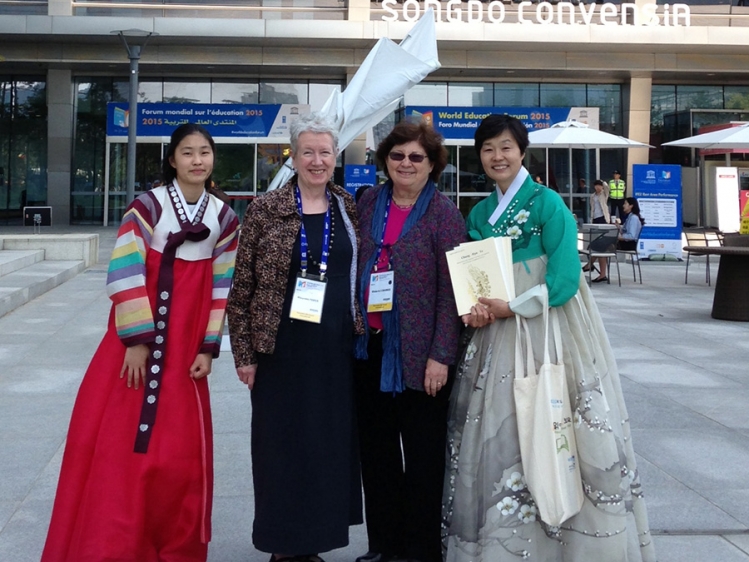In May 2015, world leaders met for two days in Incheon, Korea at the 2015 World Education Forum at the invitation of UNESCO and six co-conveners: UNDP, UNFPA, UNICEF, UNHCR, UN Women) and the World Bank Group. The event was hosted by the Government of Korea. The forum’s key themes related to the sustainable development goal #4 on education: ‘Equitable and inclusive quality education and lifelong learning for all by 2030.’ It follows the two prior World Forums on Education held over the past twenty years, first at Chiang Mai, Thailand and then at Dakar, Senegal. The final document, the Incheon Declaration, is considered to be an historic milestone.
Much work still remains, however, to finalise the Framework for Action on policies and implementation measures through a complex process of consultation. The next steps will be at UN Headquarters in New York late September and then finally at UNESCO in October 2015. UNESCO’s full title is the United Nations Education, Science, Culture and Communications Agency and it is the UN lead agency on education. Its bi-annual General Conference is UNESCO’s general assembly, where countries vote on decisions regarding topics within its mandate.
Two personal highlights for me at this forum were being able to talk with James Heckman, world renowned economist at the University of Chicago, after the session on Early Childhood Education, and Kailash Satyarthi, both Nobel Peace Laureates. Each, with their individual perspectives, is heightening international understanding about concrete ways to shift the world’s focus on priorities for all children closer to the center, beginning with the young child. No photo ops unfortunately, but profound memories to share later.
Over the next fifteen years, multiple forms of collaboration and partnerships will be explored to achieve the goals agreed upon in this exciting, highly collaborative process. Improving access to lifelong quality of education for all – not simply for some – is quite a Herculean task. However, many left the forum feeling that this goal is potentially achievable, if world leaders focus their energies and finances clearly on effective strategies to implement the Framework for Action of “Education 2030”, set within the sustainable development framework #4 goal on education.
Despite recognition of substantive progress over the past twenty years in certain countries, much hard work still remains. What is new is that more countries recognise publicly that the world needs to focus its energy on finding more effective ways to collaborate, exploring new perspectives and options, including South-South and South-North-South partnerships. Quality Education for All must contribute to the construction of a culture of peace for all. It’s in everyone’s interest to participate in this effort and encourage children to actively contribute their ideas, hopes and concrete actions towards expanding greater understanding and respect for all peoples. Countries like Tanzania, which have made significant progress in improving the national education system, shared their lessons, successes and new understandings about the huge tasks left ahead. Other countries have just begun to introduce new policies and link them to concrete, measurable implementation initiatives. One important evolution is that children’s well-being will be included in educational initiatives and achievement indicators—a step in the right direction!
Civil society participated significantly in the consultation process. Non-governmental organisations (NGOs) held a two-day NGO forum before the official forum and presented it with the NGO Declaration Education 2015. Many recommendations from the 2015 NGO Forum Declaration were included in the Incheon Declaration, which is encouraging to all those whose efforts and hard work include working with the poorest and vulnerable children and adults in difficult circumstances.
Another enjoyable encounter was with two lovely Korean ladies, a mother and daughter, who came up to Maureen Peifer and myself outside the Conference Center of the 2015 World Education Forum at Incheon, Korea. They wanted to share several books by Korean poets, philosophers and artists. They also asked us to photograph them in their flowing robes resembling flowers among the trees in the garden, together with us. A brief moment of joy and dialogue between women from different cultures – one more small step towards the construction of a culture of peace Montessori continually stressed in her life’s work. We all have to construct peace with others, step by step, one day at a time.

